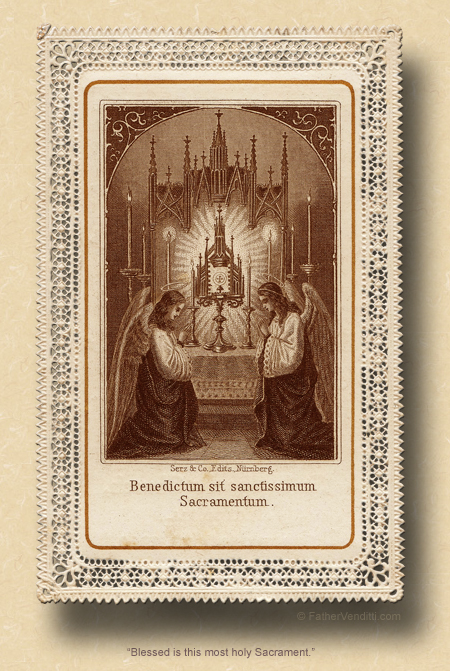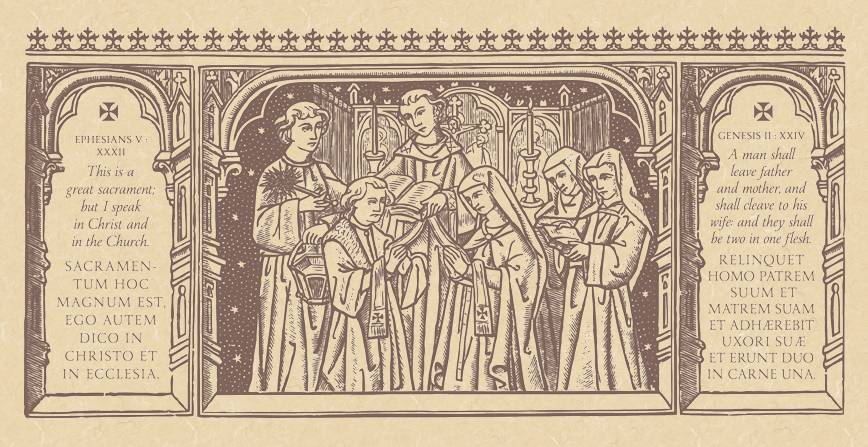Do Sacraments Really Exist?
What the Synod on the Family was really all about.
FatherVenditti.com
|
 10:42 AM 10/27/2015 — The current trend toward reverse-elitism in the Catholic Church requires that anything I have to say about the Synod be ignored. After all, I'm not a theologian, nor a bishop, nor anyone of any importance in the Church. I'm not particularly poor (though I'm not rich, either), and I'm not an unwed mother deserving of a personal phone call from the Pope. I've never been deprived of the sacraments for violating Divine Positive Law, nor have I suffered particularly at the hands of some corporation or because of man-made climate change. I'm just a priest … and a secular priest at that, so I'm lower than the busboy on the Jesuit Pope's pecking order. Any problems I may have with what I've heard or read about the Synod can be easily dismissed by chalking them up to my ignorance and/or unworthiness to be part of the conversation. 10:42 AM 10/27/2015 — The current trend toward reverse-elitism in the Catholic Church requires that anything I have to say about the Synod be ignored. After all, I'm not a theologian, nor a bishop, nor anyone of any importance in the Church. I'm not particularly poor (though I'm not rich, either), and I'm not an unwed mother deserving of a personal phone call from the Pope. I've never been deprived of the sacraments for violating Divine Positive Law, nor have I suffered particularly at the hands of some corporation or because of man-made climate change. I'm just a priest … and a secular priest at that, so I'm lower than the busboy on the Jesuit Pope's pecking order. Any problems I may have with what I've heard or read about the Synod can be easily dismissed by chalking them up to my ignorance and/or unworthiness to be part of the conversation.
That being said, I think that everyone's got this whole “Synod thing” wrong: the essential issue at stake has nothing to do with the family or marriage, it has to do with Transubstantiation; or, to put it more colloquially, is the Blessed Eucharist an outward sign instituted by Christ to give Grace, or is it just a symbol of fellowship?
When Cardinal Kasper said that those in invalid unions should be admitted to Holy Communion because to deny them is cruel and deprives them of the unity that the Eucharist is all about, he clearly indicated that he believes it's the latter; but, as far as I can tell, no one's bothered to ask the obvious follow-up question: when someone not in the State of Grace presumes to take the Blessed Eucharist, what actual grace do they receive by means of that act?
Set aside for the moment the question of what the old catechism called the “Mortal Sin of Sacrilege” incurred by those who receive unworthily. Actually, set aside the whole concepts of "worthy reception" and the “State of Grace,” since they seem to have been given no place in this debate. What is the benefit to those in invalid unions when they receive? They are made to feel welcomed. They are made to feel accepted. They are made to believe that they're part of the family of the Church. As the Holy Father said at the conclusion of the Synod: “The Synod experience also made us better realize that the true defenders of doctrine are not those who uphold its letter, but its spirit; not ideas but people; not formulae but the gratuitousness of God’s love and forgiveness.”
So, I guess anyone who defends Catholic dogma regarding the Blessed Sacrament and the State of Grace is among the “defenders of doctrine” who has put “letter” before “spirit”, “ideas” before “people”, “formulae” before “love and forgiveness.” People like me.
I'll ask the question again in a more specific way: someone gets divorced, he meets someone new, gets married outside the Church, and is now living in an ongoing conjugal relationship with that person which, according to my legalistic approach to the sacraments, separates him from grace and communion. If I, inspired by the Holy Father's words, decide to admit him to Holy Communion because spirit supersedes letter, people supersede ideas, love and forgiveness supersede formulae, what have I actually given him? What has he received?
Let's try a limping analogy: what's the difference between a sacramental marriage and a natural marriage? A Catholic entering into marriage with a baptized person enters into a sacramental marriage; but if he marries a non-baptized person there is no sacrament, even when the marriage takes place in church with the permission of his bishop. Both are Catholic marriages recognized by the Church, but what's the difference between them? I mean, what does one couple receive at their marriage ceremony that the other couple does not receive? Anything?  According to a letter-idea-formulae person like me, they receive Grace from the sacrament, but what does that mean? Does it mean anything in the Holy Father's mind? Given his words at the conclusion of the Synod, I'm not sure. According to a letter-idea-formulae person like me, they receive Grace from the sacrament, but what does that mean? Does it mean anything in the Holy Father's mind? Given his words at the conclusion of the Synod, I'm not sure.
I suppose the essential question is: what is the purpose of a sacrament? Is it salvific, or is it purely therapeutic? Why did Christ institute them? For the transmission of grace or the healing of emotions? Is a wedding a ratification of a covenant with God, or simply a celebration of romance and commitment? Is a baptism the cleansing of Original Sin and the restoration of Sanctifying Grace, or is it nothing more than a celebration of life and a welcoming into the community? Is confession the acknowledgment and forgiveness of sins, or just a form of counseling which seeks affirmation and a feeling of reconciliation? Is a Requiem Mass an appeal to God to speed the soul on its journey and keep it safe until the final Resurrection, or just a form of liturgical grief counseling for the bereaved? Is the Eucharist the Body, Blood, Soul and Divinity of Jesus Christ offered for our sins on the Altar of the Cross, or just a gathering of fellowship around the table of the Lord in which we experience unity and community with one another? In each case, both may be good, but which one is the reason it's a sacrament, and the reason Christ entrusted it to his Church to regulate and administer with the power of the keys?
Some years ago, I refused Holy Communion to someone in an invalid union. She had married a divorced man before a Protestant minister. Many years and many appointments and many words passed before her husband, worn down by my persistence and her nagging, finally agreed to submit a petition for a decree of nullity. It was granted. The day I witnessed their marriage and she was able to receive the Eucharist worthily was one of the happiest in her life. What chance would there be of that all happening now? Would the Holy Father's words inspire them to pursue the course I had for years admonished, or would they just do nothing? If I had met that couple today, would the Holy Father want me to pursue the same course, denying them access to the Sacrament for five heartbreaking years until they were finally motivated, by their own profound sense of guilt, to seek a resolution to the state of their souls? or, would he rather want me to set aside my legalistic ways and find a way to give them what they wanted now, removing any motivation to seek a solution? And if I did that, what exactly would each of them be receiving when the Sacred Host was placed on their tongues? Or am I, in fact, betraying my ignorance and lack of respect for the Holy Father by even using the phrase "Sacred Host"?
Is this whole thing really a tug of war between the Pope and evil, nasty people like me who put laws and rules above people and mercy, or is it something more basic than that? Is it not a question of whether there is such a thing as a sacrament? And what exactly constitutes real mercy? Truth, or just making people feel good about themselves?
Saint John Paul II said it best: “There is no such thing as love separated from truth.” Little did he realize that it would be the Church, herself, who would choose to reexamine whether there is such a thing as truth.

|

